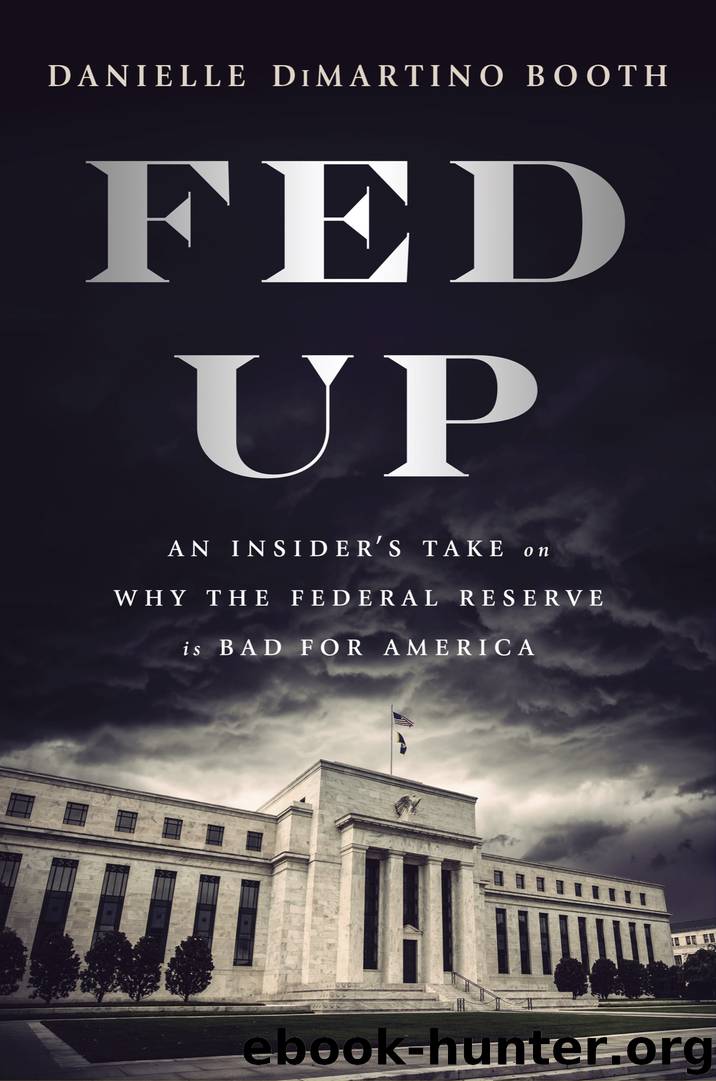Fed Up by Danielle DiMartino Booth

Author:Danielle DiMartino Booth
Language: eng
Format: epub
Publisher: Penguin Publishing Group
Published: 2017-02-01T10:58:41+00:00
“INFLATION OR DEFLATION?”
As we go through this recession
As farther down we slip
Will our central bank get traction soon, or
Will it lose its grip?
It’s a mini-Great Depression
Our markets went berserk
The Fed is printing trillions now, but
Will their efforts work?
Inflation or deflation?
Tell me, if you can
Will we become Zimbabwe
Or will we be Japan?
Credit markets came undone
And still are in distress
Will the dollars in my mattress
Buy much more next year or less?
It’s a desperate situation
When you’re at the zero bound
If a tree falls in a forest,
Is it making any sound?
New money makes inflation
If folks who have it spend
But if it only sits there,
Then the misery will not end.
Inflation or deflation?
The choice is looking grim
I wonder what John Maynard Keynes would say
If we asked him.
Inflation or deflation?
Tell me, if you can
Will we become Zimbabwe
Or will we be Japan?
Rosenblum joked that the Fed should sell T-shirts emblazoned with the motto: “We Manufacture Moral Hazard.”
The September 2009 FOMC meeting would be a testing ground for yet another battle between what had evolved into the Yellen faction and the Fisher faction, with a few moments of thigh-slapping humor.
“I agree with Presidents Evans and Yeltsin—Yellen,” said Boston Fed president Eric Rosengren at one point in the discussion. Getting the white-haired little lady with the Brooklyn accent mixed up with the vodka-swilling Russian president Boris Yeltsin provoked guffaws all around.
“I’ve gone drinking with Janet,” Fisher interjected. “She’s no Yeltsin.”
More laughter. “Okay, the last two minutes will be struck,” Bernanke said.
All still collegial. But the frequent clashes on the FOMC and the high-profile opposition Fisher was mounting against QE and ZIRP grated below the surface of the FOMC’s cordial interactions.
At the beginning of every FOMC meeting, Fisher greeted Yellen with a kiss. She always responded with good humor and grace, maybe a giggle. But they represented the opposite ends of the spectrum. One camp within the Fed included those bank presidents from Boston, New York, Chicago, and San Francisco, which were home to big financial firms. The other camp included bank presidents from Dallas, Kansas City, St. Louis, and Philadelphia, which had more diverse economies. They wanted to look at costs versus benefits of each program.
After the September meeting, Fisher and Rosenblum published an op-ed in the Wall Street Journal called “The Blob That Ate Monetary Policy,” contending that banks that the Fed deemed “too big to fail” had rendered the Fed’s traditional monetary policy tools ineffective.
“While the list of competitive advantages TBTF institutions have over their smaller rivals is long, it is also well-known,” they wrote. “We focus instead on an unrecognized macroeconomic threat: The very existence of these banks has blocked, or seriously undermined, the mechanisms through which monetary policy influences the economy.”
The interest-rate channel was gummed up. Rates that mattered for the recovery of the economy—those paid by businesses and households through mortgages, auto loans, credit cards—had risen rather than fallen. The banks with the most toxic balance sheets restricted their lending activity to shore up their own margins.
“Japan paid dearly for propping up its troubled banks in the 1990s,” wrote Fisher and Rosenblum.
Download
This site does not store any files on its server. We only index and link to content provided by other sites. Please contact the content providers to delete copyright contents if any and email us, we'll remove relevant links or contents immediately.
International Integration of the Brazilian Economy by Elias C. Grivoyannis(111059)
The Radium Girls by Kate Moore(12028)
Turbulence by E. J. Noyes(8049)
Nudge - Improving Decisions about Health, Wealth, and Happiness by Thaler Sunstein(7706)
The Black Swan by Nassim Nicholas Taleb(7129)
Rich Dad Poor Dad by Robert T. Kiyosaki(6632)
Pioneering Portfolio Management by David F. Swensen(6300)
Man-made Catastrophes and Risk Information Concealment by Dmitry Chernov & Didier Sornette(6019)
Zero to One by Peter Thiel(5802)
Secrecy World by Jake Bernstein(4753)
Millionaire: The Philanderer, Gambler, and Duelist Who Invented Modern Finance by Janet Gleeson(4478)
The Age of Surveillance Capitalism by Shoshana Zuboff(4292)
Skin in the Game by Nassim Nicholas Taleb(4248)
The Money Culture by Michael Lewis(4207)
Bullshit Jobs by David Graeber(4190)
Skin in the Game: Hidden Asymmetries in Daily Life by Nassim Nicholas Taleb(4006)
The Dhandho Investor by Mohnish Pabrai(3764)
The Wisdom of Finance by Mihir Desai(3747)
Blockchain Basics by Daniel Drescher(3582)
